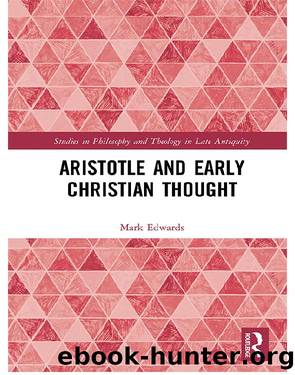Aristotle and Early Christian Thought by Edwards Mark

Author:Edwards, Mark [Edwards, Mark]
Language: eng
Format: epub
Publisher: Routledge
Inseparable relations
We have argued so far that Letter 38 is not confusing logic with ontology but using logic according to Porphyry’s definition of it as the study of words in so far as they signify. We have noted that an author who insists so strongly upon the unknowability of God could scarcely go any further; indeed, we might expect him to confess that logic is not so serviceable in these matters as in the investigation of the sublunar realm. And this he does indeed appear to confess when, in the last section of the letter, he addresses the objection that to speak of three hypostaseis is to contradict the Apostle, who at Hebrews 1:3 describes the Son as the radiance of the hypostasis of the Father, as though the Son possessed no hypostasis of his own.50 His answer, consistent with his previous reasoning, is that Paul (as he takes the writer of the epistle to be) has accommodated his language to our capacity for discernment. The Father and the Son are distinct hypostaseis, but the likeness of the image to the archetype is so perfect, the skhêsis or relation between them so intimate, that there is nothing to separate them but the skhêsis itself, and their glory appears to us to be undivided. As a further admonition not to make too much of the words that have been vouchsafed to us, we are reminded that the terms Father and Son are predicated skhêtikôs,51 that is to say, of the relation, not of the essences. It is all too plain not only that our knowledge is merely predicative, but that the science of predication is incomplete.
Once again, however, a peculiar feature of Porphyrian logic may be of use in the resolution of the difficulties that arise when one affirms that the Son and the Father are differentiated only by their relation. In the world that we know, a relation between two things is seldom if ever thought to constitute the identity of either; even when a relation, once established, is indefeasible, such as that between parent and offspring, the parent has an identity of her own which precedes the act of procreation. Moreover, parent and child will be distinguished by other properties – for example, their occupation of different spaces at any one time – which enable us to tell them apart even when we are unaware of the relation. A relation, in short, is generally accidental, not essential, to the subjects of which it is predicated; the three hypostaseis of the Christian Trinity, however, are eternally distinct in a manner that cannot be deemed contingent, so that the thing which sets them apart must be inseparably, if not essentially, bound up with the identity of each. Before Porphyry, an inseparable accident was a logical oxymoron; his Isagoge is the first text in which they are introduced as lawful subjects of predication. Modern logicians have not dealt kindly with this postulate,52 but in Gregory’s time the Isagoge was a textbook, and
Download
This site does not store any files on its server. We only index and link to content provided by other sites. Please contact the content providers to delete copyright contents if any and email us, we'll remove relevant links or contents immediately.
The Lost Art of Listening by Michael P. Nichols(6472)
Why I Am Not A Calvinist by Dr. Peter S. Ruckman(3769)
The Rosicrucians by Christopher McIntosh(3049)
Wicca: a guide for the solitary practitioner by Scott Cunningham(2704)
Signature in the Cell: DNA and the Evidence for Intelligent Design by Stephen C. Meyer(2501)
Real Sex by Lauren F. Winner(2474)
The Holy Spirit by Billy Graham(2416)
To Light a Sacred Flame by Silver RavenWolf(2353)
The End of Faith by Sam Harris(2288)
The Gnostic Gospels by Pagels Elaine(2026)
Nine Parts of Desire by Geraldine Brooks(2006)
Waking Up by Sam Harris(1958)
Heavens on Earth by Michael Shermer(1955)
Devil, The by Almond Philip C(1899)
Jesus by Paul Johnson(1887)
The God delusion by Richard Dawkins(1848)
Kundalini by Gopi Krishna(1824)
Chosen by God by R. C. Sproul(1760)
The Nature of Consciousness by Rupert Spira(1689)
